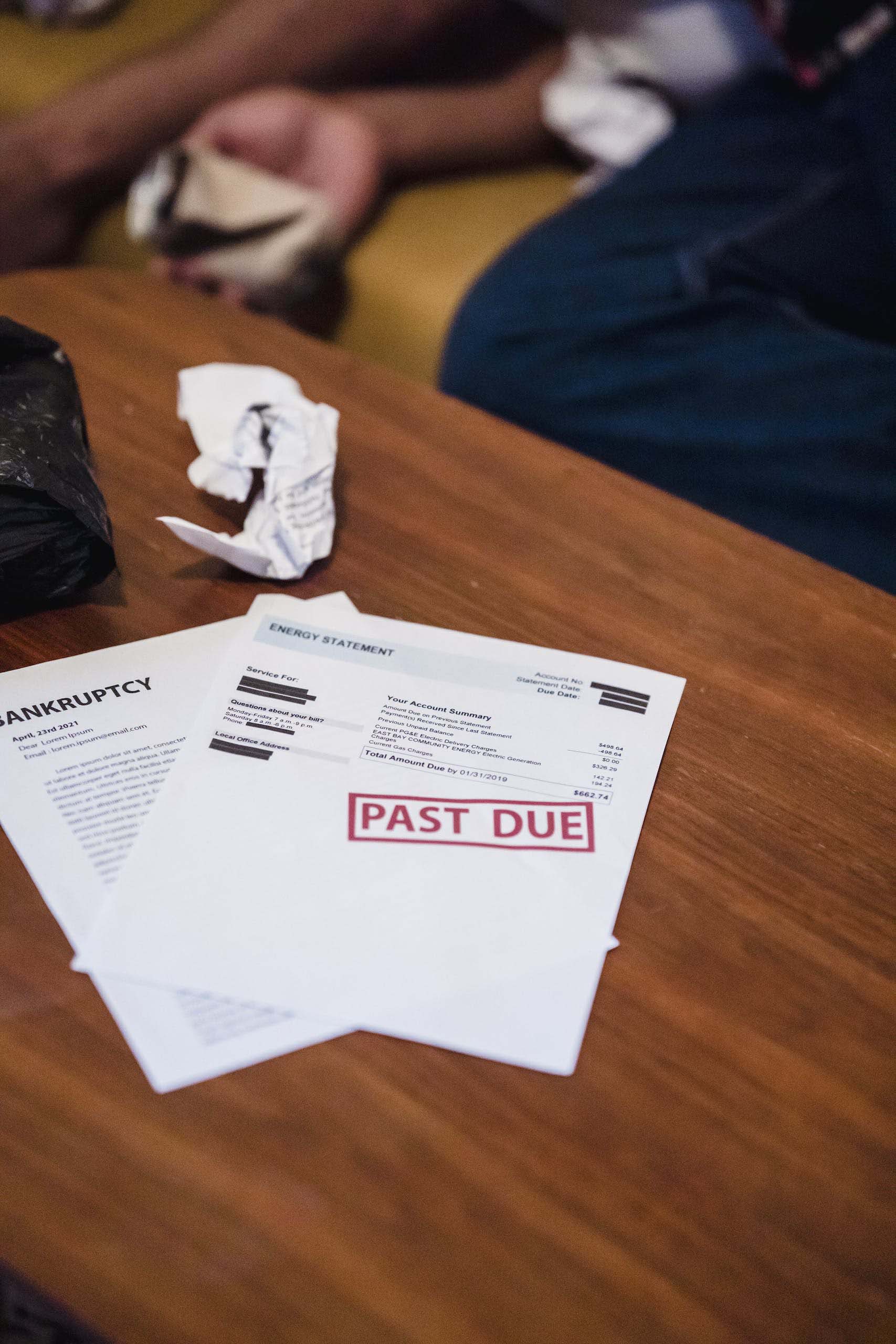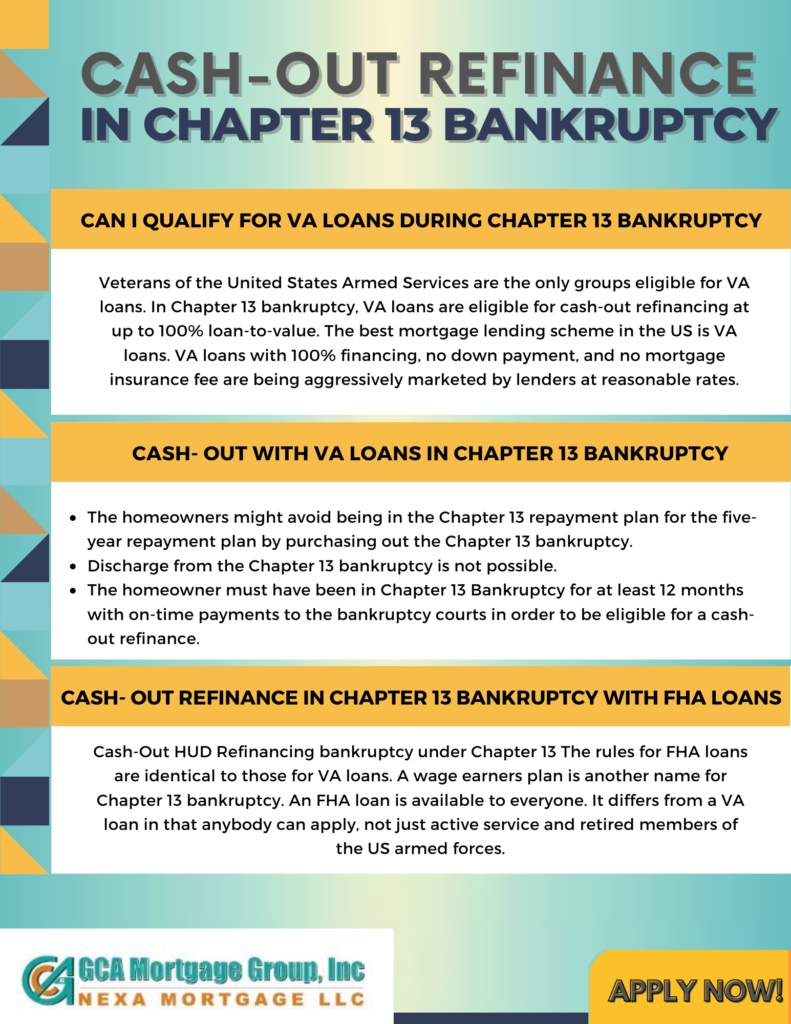Chapter 13 Cash-Out Refinance
Chapter 13 Cash-Out Refinance is a financial strategy that can offer relief and flexibility to homeowners navigating the complexities of Chapter 13 bankruptcy. In this article, we will delve into the intricacies of Chapter 13 Cash-Out Refinance, exploring its benefits, the process involved, and essential considerations for individuals seeking to leverage this option during bankruptcy.
Do You Need Help With Chapter 13 Bankruptcy? Click Here!
Chapter 13 Cash-Out Refinance: An Overview
Chapter 13 Cash-Out Refinance is a financial tool that allows homeowners in Chapter 13 bankruptcy to refinance their mortgage, extracting equity from their homes to address immediate financial needs or improve their financial situation. The primary purpose of a Chapter 13 Cash-Out Refinance is to provide homeowners with a source of funds during the bankruptcy process. This additional liquidity can cover ongoing living expenses, address urgent financial needs, or make necessary home improvements. However, it appears to combine elements from two different financial concepts:
- Chapter-13 Bankruptcy: Chapter 13 is a form of bankruptcy available in the United States, enabling individuals with consistent income to formulate a structured debt repayment plan spanning typically three to five years. It is designed to help people reorganize their finances and avoid foreclosure or other severe financial consequences.
- Cash-Out Refinance: As previously explained, a cash-out refinance entails the process of refinancing your current mortgage for a sum surpassing your existing loan balance, with the surplus funds provided to you in cash. Borrowers often use this option to access home equity for various purposes.
It’s possible that the term “Chapter 13 Cash-Out Refinance” refers to a scenario where someone in Chapter 13 bankruptcy considers refinancing their mortgage to access some of their home equity. However, this would be subject to approval by the bankruptcy court and the mortgage lender, and it may take a lot of work.
Suppose you are in Chapter 13 bankruptcy and considering a cash-out refinance. In that case, it’s crucial to consult with a bankruptcy attorney and a mortgage professional to understand such a transaction’s legal implications, requirements, and feasibility. Keep in mind that bankruptcy regulations can be intricate, and it’s essential to seek the counsel of legal and financial professionals when making any financial choices while undergoing bankruptcy.
Benefits of Chapter 13 Cash-Out Refinance:
- Access to Equity: A notable benefit of Chapter 13 Cash-Out Refinance is the opportunity to access the accumulated equity in the home. This liquidity can be crucial for addressing financial challenges or making necessary investments.
- Debt Consolidation: Homeowners can use the funds obtained through the cash-out refinance to consolidate high-interest debts, simplifying their financial obligations and potentially reducing overall interest costs.
- Improved Financial Stability: Homeowners can enhance their financial stability by accessing additional funds during Chapter 13 bankruptcy. This can result in a more easily manageable financial situation, facilitating adherence to the terms of the bankruptcy repayment plan.
- Home Improvements: Chapter 13 Cash-Out Refinance allows homeowners to invest in home improvements, potentially increasing the property’s value. This dual benefit addresses immediate financial needs while contributing to long-term asset appreciation.
The Process of Chapter 13 Cash-Out Refinance:
Before pursuing Chapter 13 Cash-Out Refinance, homeowners should consult their bankruptcy attorney. Legal advice is crucial to understanding the implications and ensuring compliance with bankruptcy laws. Lenders will assess the home’s equity to determine the amount available for cash-out refinancing. The calculation of equity is determined by considering the current market value of the home along with the remaining balance on the mortgage.
Homeowners will need to apply for the cash-out refinance with a mortgage lender. The approval process considers creditworthiness, income, and the home’s value. Working with a lender experienced in bankruptcy cases can be advantageous. The cash-out refinance must comply with Chapter 13 bankruptcy requirements. The bankruptcy court’s approval may be necessary, and the bankruptcy plan should use the funds obtained.
Talk to Our Expert Loan Officer To Learn More About Chapter 13 Bankruptcy.
Considerations and Cautionary Notes:
A. Impact on Bankruptcy Plan:
Chapter 13 Cash-Out Refinance can impact the existing bankruptcy plan. Homeowners must ensure that funds align with the court-approved plan and seek approval for any modifications.
B. Costs and Fees:
Homeowners should know the costs of refinancing, including closing costs and fees. These expenses should be factored into the overall financial plan to determine the feasibility of the cash-out refinance.
C. Financial Counseling:
Seeking financial counseling is advisable before making significant financial decisions during bankruptcy. Counselors can guide budgeting, financial management, and the potential long-term impact of financial decisions.
Challenges of Chapter 13 Bankruptcy:
- Longer Duration: In Chapter 13 bankruptcy, individuals are required to adhere to a repayment plan that extends over a period of three to five years. The extended duration can be challenging for individuals who may face financial uncertainties or changes in income during this period.
- Stringent Budgeting: The repayment plan under Chapter 13 requires individuals to follow a stringent budget in order to fulfill their obligations. This can be challenging for those accustomed to a more flexible financial lifestyle.
- Credit Impact: Similar to other forms of bankruptcy, Chapter 13 has a significant impact on credit. The filing remains on the credit report for several years, affecting the ability to secure credit at favorable terms.
- Approval Challenges: The court and creditors must approve the proposed repayment plan. If the plan is not accepted, individuals may need to make adjustments or consider alternative bankruptcy options.
- Complexity of the Process: Chapter 13 bankruptcy involves a complex legal process. Navigating the requirements, documentation, and court appearances can pose difficulties in the absence of the assistance of a seasoned bankruptcy attorney.
- Potential for Plan Failure: Unforeseen circumstances such as job loss, medical emergencies, or other financial setbacks can jeopardize the successful completion of the repayment plan. If individuals are unable to meet the plan requirements, the bankruptcy may be dismissed.
- Stigma and Public Record: Chapter 13 bankruptcy is a matter of public record, which can lead to a perceived stigma. The lack of privacy can be emotionally challenging for individuals who may feel exposed during a difficult financial period.
- Difficulty in Obtaining New Loans: Individuals in Chapter 13 may find it challenging to secure new loans or mortgages during the repayment period. Lenders may view them as higher-risk borrowers, impacting their ability to make significant financial commitments.
- Limited Flexibility: The structured nature of Chapter 13 limits financial flexibility during the repayment period. Any major financial decisions or changes to the plan may require court approval.
- Commitment to Repayment: Successfully completing the Chapter 13 plan requires a significant commitment to making regular payments. Individuals must prioritize these payments over other discretionary expenses, which can be challenging.
- Dependency on Income Stability: Chapter 13 relies on a stable income to fund the repayment plan. Fluctuations in income or unexpected financial challenges can disrupt the ability to meet plan obligations.
Despite these challenges, Chapter 13 bankruptcy provides a structured framework for individuals to address their debts while retaining their assets. Consulting with a knowledgeable bankruptcy attorney and seeking financial counseling can help individuals assess whether Chapter 13 is the right option for their specific financial situation and navigate the challenges effectively. Qualify for loan during chapter 13 bankruptcy, Click here
Frequently Asked Questions (FAQs)
- What is a Chapter 13 cash-out refinance? A Chapter 13 cash-out refinance is a refinancing option available to homeowners currently in a Chapter 13 bankruptcy repayment plan. It allows them to access their home equity for various financial needs.
- How does a Chapter 13 cash-out refinance work? In this refinance, the homeowner can borrow against their home’s equity while restructuring their debts within the Chapter 13 bankruptcy plan.
- What are the benefits of a Chapter 13 cash-out refinance? The main benefit is using home equity to pay off or consolidate debts, potentially lowering interest rates and monthly payments. It can also help homeowners get back on track with their Chapter 13 plan.
- Can anyone in a Chapter 13 bankruptcy apply for a cash-out refinance? Not everyone qualifies, and eligibility may depend on the lender’s policies and the court’s approval. It’s essential to consult with your bankruptcy attorney and a mortgage professional.
- How much equity can I access with a Chapter 13 cash-out refinance? The amount of equity you can access depends on various factors, including the current value of your home and the lender’s guidelines. Usually, you can tap into as much as 80% of the equity in your home.
- Are there specific requirements or waiting periods for Chapter 13 cash-out refinances? Lenders may have specific requirements, and you should have approval from the bankruptcy court. Waiting periods can vary but may be shorter than for traditional loans.
- Can I use the funds from a Chapter 13 cash-out refinance? Generally, you can use the funds for various purposes, including debt consolidation, home improvements, or other financial needs.
- What are the potential downsides or risks of a Chapter 13 cash-out refinance? Risks may include extending the repayment period and increasing overall debt. It’s essential to consider your financial situation and consult with a professional carefully.
- How does the Chapter 13 bankruptcy process affect my ability to refinance? The Chapter 13 process can be complex, and it’s crucial to work closely with your bankruptcy attorney and a mortgage professional who understands the intricacies of bankruptcy refinancing.
- How can I determine if a Chapter 13 cash-out refinance is right for me? Consult with your bankruptcy attorney and a mortgage professional to evaluate your circumstances and financial goals to determine if this refinance suits you.
All in all, Chapter 13 Cash-Out Refinance emerges as a valuable financial tool for homeowners navigating the challenges of Chapter 13 bankruptcy. By unlocking the equity in their homes, individuals can address immediate financial needs, consolidate debts, and enhance overall financial stability.
However, the process requires careful consideration, adherence to bankruptcy regulations, and consultation with legal and financial professionals. Homeowners should approach Chapter 13 Cash-Out Refinance as a strategic step toward rebuilding their financial foundation while remaining compliant with the terms of their bankruptcy plan.
Our Loan Officers here at Gustan Cho Associates are experts in Chapter 13 Cash-Out Refinance. You can contact us at 800-900-8569 or text us for a faster response. You can also email us at alex@gustancho.com. Our expert Loan Officers are available even during weekends and holidays!


